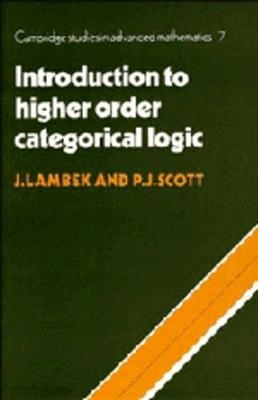
Introduction to Higher-Order Categorical Logic
Seiten
1988
Cambridge University Press (Verlag)
9780521356534 (ISBN)
Cambridge University Press (Verlag)
9780521356534 (ISBN)
In this book the authors reconcile two different viewpoints of the foundations of mathematics, namely mathematical logic and category theory. Numerous applications of the close relationship between traditional logic and the algebraic language of category theory are given. Detailed references are provided and each section concludes with exercises.
In this book the authors reconcile two different viewpoints of the foundations of mathematics, namely mathematical logic and category theory. In Part I, they show that typed lambda-calculi, a formulation of higher order logic, and cartesian closed categories are essentially the same. In Part II, it is demonstrated that another formulation of higher order logic (intuitionistic type theories) is closely related to topos theory. Part III is devoted to recursive functions. Numerous applications of the close relationship between traditional logic and the algebraic language of category theory are given. The authors have included an introduction to category theory and develop the necessary logic as required, making the book essentially self-contained. Detailed historical references are provided throughout, and each section concludes with a set of exercises. Thus it is well-suited for graduate courses and research in mathematics and logic. Researchers in theoretical computer science, artificial intelligence and mathematical linguistics will also find this an accessible introduction to a subject of increasing application to these disciplines.
In this book the authors reconcile two different viewpoints of the foundations of mathematics, namely mathematical logic and category theory. In Part I, they show that typed lambda-calculi, a formulation of higher order logic, and cartesian closed categories are essentially the same. In Part II, it is demonstrated that another formulation of higher order logic (intuitionistic type theories) is closely related to topos theory. Part III is devoted to recursive functions. Numerous applications of the close relationship between traditional logic and the algebraic language of category theory are given. The authors have included an introduction to category theory and develop the necessary logic as required, making the book essentially self-contained. Detailed historical references are provided throughout, and each section concludes with a set of exercises. Thus it is well-suited for graduate courses and research in mathematics and logic. Researchers in theoretical computer science, artificial intelligence and mathematical linguistics will also find this an accessible introduction to a subject of increasing application to these disciplines.
Preface; Part I. Introduction to Category Theory: Part II. Cartesian Closed Categories and Calculus: Part III. Type Theory and Toposes: Part IV. Representing Numerical Functions in Various Categories; Bibliography; Author index; Subject index.
| Erscheint lt. Verlag | 25.3.1988 |
|---|---|
| Reihe/Serie | Cambridge Studies in Advanced Mathematics |
| Zusatzinfo | Worked examples or Exercises |
| Verlagsort | Cambridge |
| Sprache | englisch |
| Maße | 150 x 227 mm |
| Gewicht | 500 g |
| Themenwelt | Geisteswissenschaften ► Philosophie ► Logik |
| Mathematik / Informatik ► Mathematik ► Allgemeines / Lexika | |
| ISBN-13 | 9780521356534 / 9780521356534 |
| Zustand | Neuware |
| Informationen gemäß Produktsicherheitsverordnung (GPSR) | |
| Haben Sie eine Frage zum Produkt? |
Mehr entdecken
aus dem Bereich
aus dem Bereich
ein Gegenentwurf zum kurzfristigen Denken : so werden wir zu den …
Buch | Hardcover (2023)
REDLINE (Verlag)
CHF 27,90


